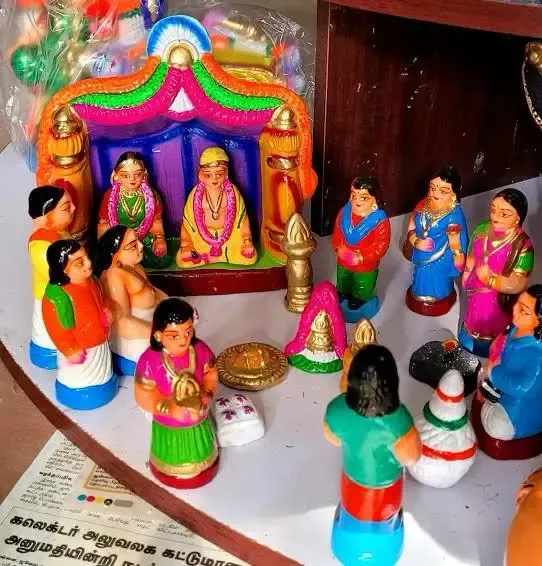Are TN’s Kancheepuram Artisans Facing a Crisis as US High Tariffs Stall 'Golu Doll' Exports?

Synopsis
Key Takeaways
- Kancheepuram artisans face a livelihood crisis due to high US tariffs.
- Thousands of unsold golu dolls are affecting their income.
- Government intervention is crucial to save this traditional craft.
- The craft has been passed down for generations, emphasizing its cultural significance.
- Festivals like Navaratri are vital for their financial stability.
Chennai, Sep 3 (NationPress) Traditional artisans in Kancheepuram are experiencing a significant livelihood crisis as thousands of 'golu dolls', valued at several crores of rupees, remain unsold due to the recent 50 percent additional import duty imposed by the US.
Each year, Indian families residing abroad, especially in the US, place large orders for golu dolls during Navaratri to recreate the festive spirit of their homeland. However, the steep duty this year has discouraged purchases, leaving artisans in Tamil Nadu grappling with unsold inventory.
Approximately 50 families across four streets near the historic Varadaraja Perumal temple in Kancheepuram have been dedicated to the craft of making golu dolls for four to five generations. This craft is their primary source of income, with dolls traditionally sold throughout Tamil Nadu and neighboring states such as Andhra Pradesh, Telangana, Karnataka, and Kerala.
In recent decades, exports to the US, Canada, Germany, and the UK have provided essential income, with the US recognized as the largest foreign market.
“NRIs in the US consistently placed large orders for Navaratri. The income from international buyers surpasses domestic sales. This year, due to the added import duty, people are reluctant to place orders, and our sales have plummeted,” expressed a doll maker.
Compounding the issue, courier and postal services to the US have halted shipments, leaving consignments stranded in Kancheepuram.
With Navaratri approaching, thousands of dolls, meticulously crafted over months, remain piled up in workshops and storerooms. For these artisans, festival seasons like Krishna Jayanthi, Vinayaka Chaturthi, and Navaratri typically yield the bulk of their annual earnings.
The sudden disruption has plunged them into profound financial distress. Many fear that without immediate intervention, their centuries-old tradition of doll-making may vanish. Artisans have appealed to both the state and central governments for assistance, urging government-run handicraft bodies to purchase dolls in bulk to alleviate their unsold stock and request subsidies similar to those provided to fishermen during the annual fishing ban.
“With Navaratri just around the corner, we are left with unsold dolls worth crores. Without assistance, we are uncertain about our survival,” lamented one artisan, encapsulating the uncertainty that clouds their future.








